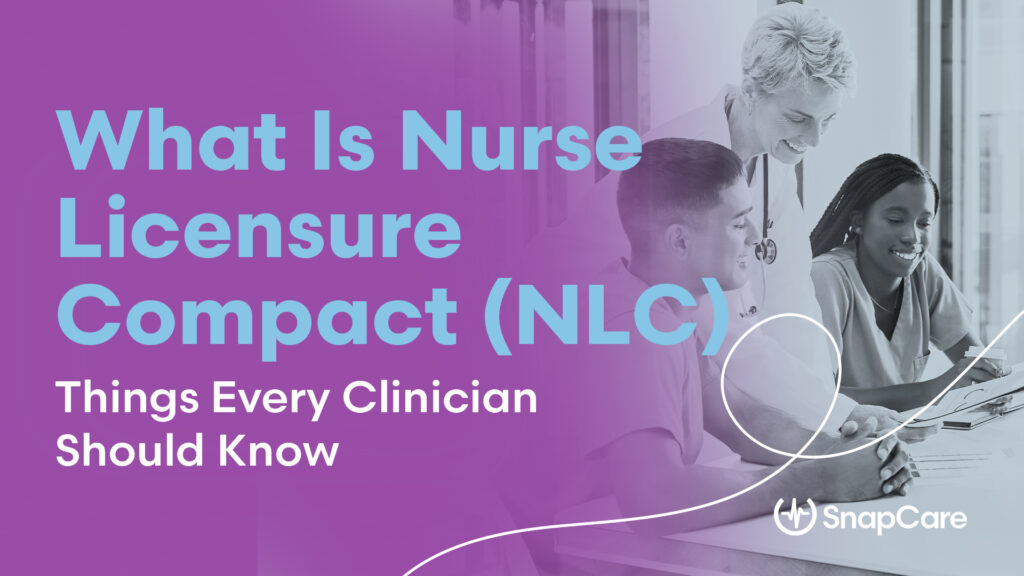Nurses are indispensable when it comes to providing quality care to patients. With advancements in technology and healthcare systems, the demand for nursing professionals has surged. However, this surge has led to an increasing need for nurses to be flexible in their practice, especially when it comes to crossing state lines. This is why the Nurse Licensure Compact (NLC) is crucial.
In this article, we’ll explore what the Nurse Licensure Compact is and how it impacts clinicians’ ability to practice nursing across state lines. As a bonus, we’ll also provide the steps and some tips on how to get that NLC license.
What is NLC
The Nurse Licensure Compact, often referred to as the NLC, is an agreement among multiple U.S. states that allows licensed nurses to practice nursing across state lines without the need for obtaining additional licenses.
This compact is designed to simplify the process of practicing nursing in different states, making it easier for clinicians to take on travel assignments and provide care where it’s needed most.
How Does the NLC Work
The NLC functions by allowing nurses with a multi-state license to practice in their home state and other states within the compact. The license, known as a multi-state license, grants nurses the privilege to work in any participating NLC state, much like having a driver’s license that’s recognized in multiple states.
This means that nurses can provide care to patients residing in different states without the hassle of applying for multiple licenses. At the same time, this also helps maintain high standards of care between member states in the compact.
Why Would Nurses Need a Multi-State License
Nurses must hold a valid license in the state where they are delivering nursing services to their patients. But now, there’s something called a multistate license, like the Nurse Licensure Compact (NLC). With this special license, nurses can work in their home state and all the other states in the compact with just a single license issued by their home state.
Benefits of the NLC for Clinicians
All nurses would agree that getting a license is a major milestone. You can’t begin your journey as a registered nurse without one. Fortunately, recent years have seen significant improvements in the licensing process, making it easier for nurses to work in different states. This positive change is brought about by the introduction of the Nurse Licensure Compact (NLC).
Here are the numerous benefits that NLC provides for registered nurses (RNs) and licensed practical nurses (LPNs):
Enhanced Flexibility
The NLC significantly enhances the flexibility and mobility of nurses, allowing them to take advantage of a wide range of opportunities in various states. This flexibility is a real game-changer for nurses who work per diem in nearby states or for travel nurses who hop between multiple states throughout the year.
Having a compact state license makes it much easier for travel nurses to manage their assignments efficiently and helps them avoid the hassle of waiting for an out-of-state license.
Reduced Administrative Burden
With the NLC in place, nurses can bypass the tedious process of obtaining a separate license for each state in which they wish to practice. This reduction in administrative red tape simplifies the licensing process, eliminating the need for extensive renewal requirements and additional fees.
Larger Pool of Opportunities
Nurses with a multi-state license can explore job opportunities in multiple states, which can be particularly advantageous for those seeking temporary assignments, such as CNA local travel contracts. This expanded job market allows clinicians to find positions that align with their career goals and interests.
Quick Response in Times of Crisis
During emergencies or natural disasters, healthcare facilities often require additional nursing staff to handle the influx of patients. The NLC enables nurses to swiftly respond to these situations by practicing in states other than their home state without any delay in licensing.
Increased Patient Access to Care
The NLC ultimately benefits patients by ensuring that they have access to a larger pool of highly skilled nurses. This is especially crucial in rural or underserved areas where healthcare professionals may be in short supply.
Eligibility for NLC Compact License
Getting a compact state nursing license is a straightforward process, especially if you’re living in a state that’s already part of the compact. As outlined by the National Council of State Boards of Nursing (NCSBN), here are the criteria that nurses need to meet when applying for a multi-state nursing license:
- You should live in and officially designate an NLC state as your primary state of residence.
- Fulfill all the licensure requirements specific to your primary state of residence.
- Maintain a good standing as either a registered nurse (RN) or a licensed practical nurse (LPN)/licensed vocational nurse (LVN) in your primary state of residence.
It’s important to note that if you’re a nurse planning to move to another state, you must update your primary state of residence, even if the move doesn’t change your license status. Additionally, there might be some other requirements outlined by the NCSBN that you’ll need to meet, depending on your home state.
Requirements for Working in an NLC State
- Graduate from a board-approved education program
- NCLEX Passer
- Eligible for or holds an active, unencumbered license
- Submit state and federal fingerprint-based criminal background checks
- Have not been convicted or found guilty of a felony offense under state or federal criminal law
- Have no misdemeanor convictions or disciplinary actions related to the practice of nursing
- Not currently a participant in an alternative program
- Have a valid United States Social Security number
To apply for an NLC Compact license, head over to your home state’s Board of Nursing (BON). You can conveniently access your state’s BON and licensure applications through the Nurse Licensure Compact website.
Compliance with State Laws and Regulations
While the NLC facilitates nursing practice across state lines, nurses must adhere to the laws and regulations of the state where they are providing care. This includes compliance with state-specific scope of practice and continuing education requirements. It’s essential for nurses to familiarize themselves with the rules of the state they intend to work in to ensure they practice within the legal boundaries.
Participating States
While the Nurse Licensure Compact is a great initiative, it’s important to note that not all U.S. states are part of the compact. As of today, a total of 41 states have enacted and/or implemented the Nurse Licensure Compact (NLC) agreement. Here is a list of the states that are currently part of this compact:
| Alabama | Kansas | New Mexico | Utah |
| Arizona | Kentucky | North Carolina | Vermont |
| Arkansas | Louisiana | North Dakota | Virgin Islands** |
| Colorado | Maine | Ohio | Virginia |
| Delaware | Maryland | Oklahoma | Washington* |
| Florida | Mississippi | Pennsylvania* | West Virginia |
| Georgia | Missouri | Rhode Island** | Wisconsin |
| Guam* | Montana | South Carolina | Wyoming |
| Idaho | Nebraska | South Dakota | |
| Indiana | New Hampshire | Tennessee | |
| Iowa | New Jersey | Texas |
*Indicates partial implementation
**Indicates enactment, waiting for implementation
It’s crucial to understand that the requirements may differ from one state to another, so it’s advisable to check with the appropriate licensing board for specific details.
How to Apply For an NLC Nursing License
Here’s some great news. If you live in a state that’s part of the Nurse Licensure Compact (NLC) and you already met the requirements for a nursing license there, you probably already have a multistate license. But if you only have a license for one state, don’t worry. Just follow these steps to get a multistate license:
Step 1: Choose your home state
If you’re a registered nurse or a licensed practical nurse obtaining a compact nursing license, the first step is to select a state that’s part of the NLC. It’s important to decide about the state where you plan to reside and practice nursing before proceeding with your license application.
If you happen to live in a home state that participates in the NLC and intend to work in another compact state, the process is a lot simpler. You’ll only need to apply for a multistate compact license in your home state.
Step 2: Determine your eligibility
Before applying for the NLC, confirm that you meet your home state’s requirements for eligibility. Typically, this involves having an active, unencumbered nursing license, having successfully passed the NCLEX exam, and maintaining a good track record.
Step 3: Submit an application
Contact your state’s nursing regulatory body to request an application for the NLC. Ensure that you complete all required forms accurately.
Step 4: Pay the fees
There may be one-time fees associated with applying for the multi-state license. Be sure to include the necessary payment and the receipt with your application.
Step 5: Provide verification
Your licensing board may require verification of your nursing credentials and background. Ensure that you provide all requested documentation promptly.
Step 6: Wait for approval
Once you’ve submitted your application and necessary documents, your licensing board will review your application. The review process may take up to 30 days. If you meet all requirements, they will grant you a multi-state license.
Step 7: Begin practicing across state lines
With your NLC nursing license in hand, you can now start practicing nursing in other participating NLC states. It’s essential to familiarize yourself with the specific rules and regulations of the state you plan to work in to ensure compliance.
Discover New Opportunities With SnapCare
The Nurse Licensure Compact (NLC) has revolutionized the way nurses practice across state lines, offering numerous benefits to clinicians seeking flexibility and career opportunities. With the ability to take on CNA local travel contracts and explore diverse job markets, nurses with a multi-state license have the freedom to pursue their professional goals and provide essential care wherever it’s needed most.
If you’re a nurse considering practicing in multiple states, SnapCare is here for you! Our technology-driven platform makes it easy for you to look through many job openings and find the one that fits you perfectly.
In 7 easy steps, you can join SnapCare today!



